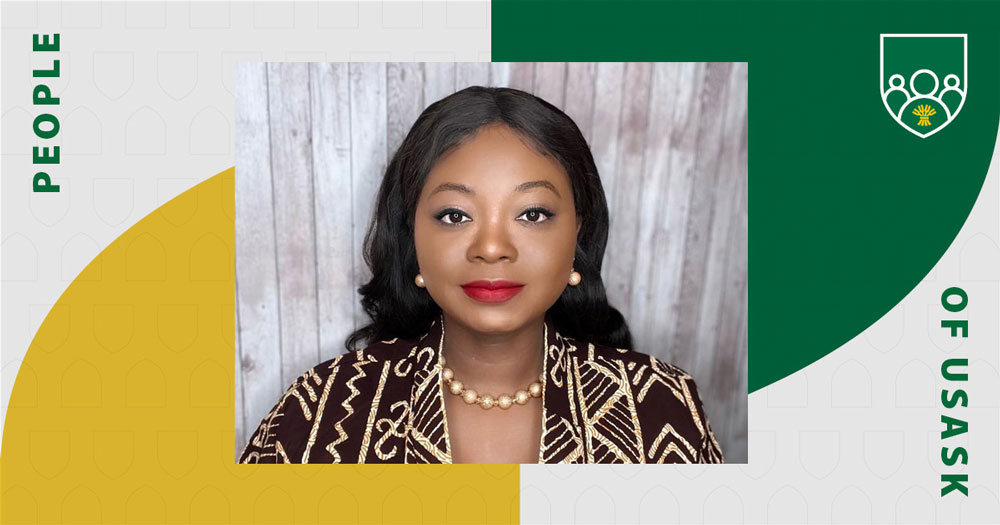
People of USask: Dr. Zita Seshie
Dr. Zita Seshie (PhD’19) has always had a passion for education. As a young girl in Ghana (West Africa), she was taught about the importance of a love for learning. Her mother was uneducated but had a passion to ensure her children received the best education possible. Dr. Seshie’s upbringing is what continues to inspire her to pursue a life of learning and to conduct research in social justice of the right for girls to receive an education in Africa.
Q. Why did you decide to come to Canada for your graduate studies?
My brother had a friend who came to Canada to pursue her master’s in social justice. And from a young age I was always passionate about being a lawyer. So, when my brother heard that his friend went to Canada to do a degree in social justice, he said ‘that would be a good segue into your law career.’ After doing some research I ended up applying and getting into the social justice and equity studies program at Brock University. I came in 2012 and have been in Canada ever since.
Q. Why did you decide to do your PhD at USask?
When I was doing my master’s, I actually wanted to write about the importance of education for girls in Ghana and other West African countries. That was something that I was extremely passionate about. Unfortunately, I couldn't write that as my master's thesis, because I did not find a supervisor whose research intersected with education and gender in African countries. Now when looking at a PhD. program I wanted to find a supervisor that had knowledge about girls' education in Africa. At USask, there was a supervisor who was originally from Nigeria and so I knew she would understand the passion behind my work, and so my decision was made.
Q. Was there anyone who influenced you during your time as a student and faculty member?
My supervisor, Dr. Patience Elabor-Idemudia in the Department of Sociology. She is originally from Nigeria and has an established career in Canada and worked for the United Nations and different global agencies. She understood the passion behind my work and supported me throughout my doctoral work and my documentary.
Q. Do you have a favourite memory of your time as a student?
My favourite memory is when I produced a documentary out of my doctoral research on the education of girls in African countries. I decided to micro-fundraise for the project and the support I saw from the faculty in the sociology department and from the greater student body was amazing. I got my family to send me beautiful jewelry and different cultural accessories from Ghana. The students were fascinated by the vibrancy of African colours. I also participated in Fringe Festival (in Saskatoon) and got to share with Saskatoon why girls' education is important. I think USask and Saskatoon have made it possible for me to impact my community and produce a documentary that the world can see as part of my time working at USask as a graduate student.
Q. Who inspires you to do what you do?
My mother. My mother is not educated. She could not complete basic education, mainly because she did not come from a family that had enough financial resources. So, her parents did not prioritize her education, and my mother's story of not being educated is the story of many women in Ghana and other African countries. When I look at my life and all that I've been able to accomplish, I am humbled that my mother, who could not even complete Grade 6, nurtured a woman like me, who is extremely intelligent and has been able to break several gender limitations connected to the Ghanaian and the African culture.
Q. What would you say to other international students considering attending USask?
I would say that Canada is really a beautiful place. I call Canada my second home, and my adopted home, because Canada has given me great opportunities that I could have never dreamed of. If I could say anything, come with an open mind and look beyond the certificates you’re hoping to get. Education is more than the certificate and the grades - it’s about life and mental transformation. Transform your mind. It will allow you to see other things, and what is possible and when you do that the sky is the limit. The certificate is good, but allow your education to give you a change in mindset and a change in orientation in terms of how you see life and how you can have a positive impact on others.
It’s the People of USask who enable us to be what the world needs.
Discover more People of USask stories.
Are you USask Alumni who graduated with a PhD between 2011-2021? The College of Graduate and Postdoctoral Studies has launched a PhD alumni survey and wants your help in continuing to provide an environment that fosters the growth of our current PhD students. Check your email for the link to participate. If you have any questions regarding this survey, please contact marc.usunier@usask.ca.

